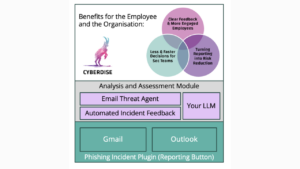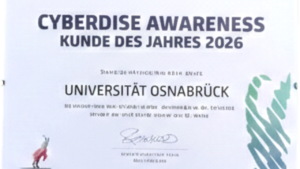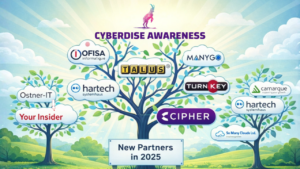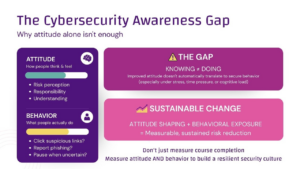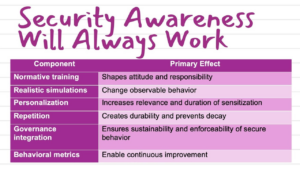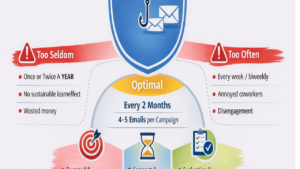GDPR vs NIS2 vs ISO 27001: Is There Any Difference?
Published Date:
- December 13, 2024
16 Days. 16 Cybersecurity Secrets. Start unwrapping your CYBERDISE Advent Calendar now!
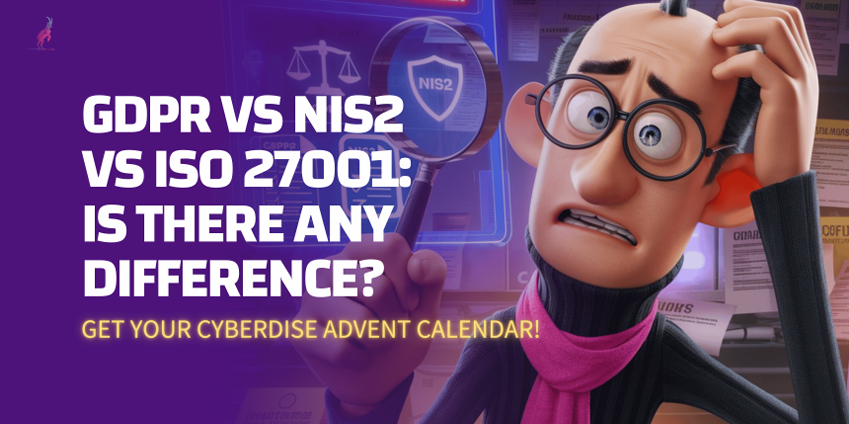
GDPR vs NIS2 vs ISO 27001: Key Differences Explained
Compliance isn’t just a buzzword – it’s a cornerstone of trust, security, and resilience. But navigating the differences between GDPR, NIS2, and ISO 27001 can feel like solving a puzzle. What do you need to know, and why does it matter? Let’s break it down.
GDPR: The Backbone of Data Privacy
The General Data Protection Regulation (GDPR) safeguards personal data across the EU, applying to any organization processing EU residents’ data, no matter where it’s based.
Key Features:
- Data Breach Notifications: Authorities must be notified of breaches within 72 hours.
- Data Protection by Design and Default: Privacy and security integrated from the start.
- Data Subject Rights (Peoples’ Rights): Includes the right to access, correct, and delete personal data.
- Mandatory DPO (Data Privacy Officer): Required for certain organizations, like public authorities.
Non-Compliance Risk:
- Fines: Up to €20 million or 4% of global turnover.
- Reputation: Erosion of trust and potential loss of business.
Pro Tip: Aligning with ISO 27001 can streamline GDPR compliance, especially for technical and organizational measures.
NIS2: Strengthening Critical Infrastructure
The Network and Information Security Directive (NIS2) is the EU’s answer to rising cybersecurity threats, targeting operators of essential services and digital providers to ensure national security and resilience.
What’s New in NIS2?
- Stricker Reporting Timelines: Initial incident reports are required within 24 hours.
- Top Management Accountability: CEOs and senior leaders are directly responsible for cybersecurity failures.
- Mandatory Audits: Regular regulator-led inspections to assess compliance.
- Heavy Fines: Up to €10 million or 2% of global turnover.
Who Needs to Comply?
NIS2 applies to organizations classified as Essential Entities and Important Entities, based on their role in critical sectors and potential impact on societal stability:
- Essential Entities: Critical industries like energy, healthcare, finance, digital infrastructure, transportation, and drinking water supply, where disruptions could have severe consequences.
- Important Entities: Key industries such as chemical manufacturing, food production, postal services, waste management, and public administration, whose disruptions could still significantly impact society.
To fall under NIS2, organizations must typically have 50+ employees or €10 million+ turnover, though smaller entities are included if they play a critical role in supply chains or essential services.
Takeaway: Compliance with NIS2 demands proactive risk management, top-level involvement, and stringent adherence to reporting and auditing requirements.
ISO 27001: The (no longer so) Voluntary Cybersecurity Framework
Unlike GDPR and NIS2, ISO 27001 is a voluntary international standard designed to help organizations establish and maintain robust Information Security Management Systems (ISMS).
Who Consider ISO 27001?
- Risk Mitigation: Protects information assets and reduces vulnerabilities across your organization.
- Competitive Edge: Many contracts and partnerships require ISO 27001 certification.
The Key Difference:
ISO 27001 imposes no legal penalties. However, non-compliance could lead to the loss of certification, potentially impacting business reputation and opportunities.
Takeaway: ISO 27001 is optional, but it is a powerful tool for improving your organization’s security posture and meeting contractual requirements. Indispensable for IT companies, companies that process personal data on a large scale and for SaaS companies in the medium term.
WE HAVE A GIFT FOR YOU

Happy Holidays from all of us at Cyberdise! To make this season even more special, we’ve prepared a unique gift for you – our Cybersecurity Advent Calendar ”The Grinch who phished Christmas”. Start unwrapping today! Inside, you’ll find daily surprises, including phishing simulations, cybersecurity tips, engaging quizzes, and even some festive fun like jokes and puzzles. Each day is designed to make you smarter and safer online, all while keeping the holiday spirit alive. Don’t miss the special message from our Ibex mascot!
Key Differences at a Glance
GDPR
Purpose: Personal dataprotection
Scope: Any organization processing EU residents’ data
Penalties: Up to €20M or 4% of turnover
Compliance type: Mandatory
NIS2
Purpose: Securing critical infrastructure
Scope: Operators of essential services and digital providers
Penalties: Up to €10M or 2% of turnover
Compliance type: Mandatory for organizations classified as Essential Entities and Important Entities
ISO 27001
Purpose: Information security management
Scope: All types of organizations
Penalties: Loss of certification
Compliance type: (No longer so) Voluntary
Pro Tip: While ISO 27001 is voluntary, it provides a strong foundation for meeting many GDPR and NIS2 requirements, so don’t neglect it right away!
How GDPR, NIS2, and ISO 27001 Interconnect
Understanding the relationships between GDPR, NIS2, and ISO 27001 is essential for organizations aiming to build a robust compliance framework. Here’s how they align and differ:
GDPR + ISO 27001: ISO 27001 helps fulfill GDPR’s technical and organizational requirements, such as data protection by design.
NIS2 + ISO 27001: ISO 27001 provides a foundation for many of NIS2’s requirements, like risk management and access controls, but doesn’t cover its regulatory oversight aspects.
GDPR vs NIS2: GDPR focuses on protecting individuals’ personal data, while NIS2 is concerned with the cybersecurity of critical infrastructure.
In Conclusion: Choosing the Right Approach
Whether you’re securing personal data, protecting critical infrastructure, or enhancing your overall cybersecurity posture, understanding the differences and overlaps between GDPR, NIS2, and ISO 27001 is essential. Each framework plays a distinct role but together offers a comprehensive approach to compliance and security.
Ready to dive deeper? Explore how Cyberdise can help streamline your compliance journey in the area of awareness.

